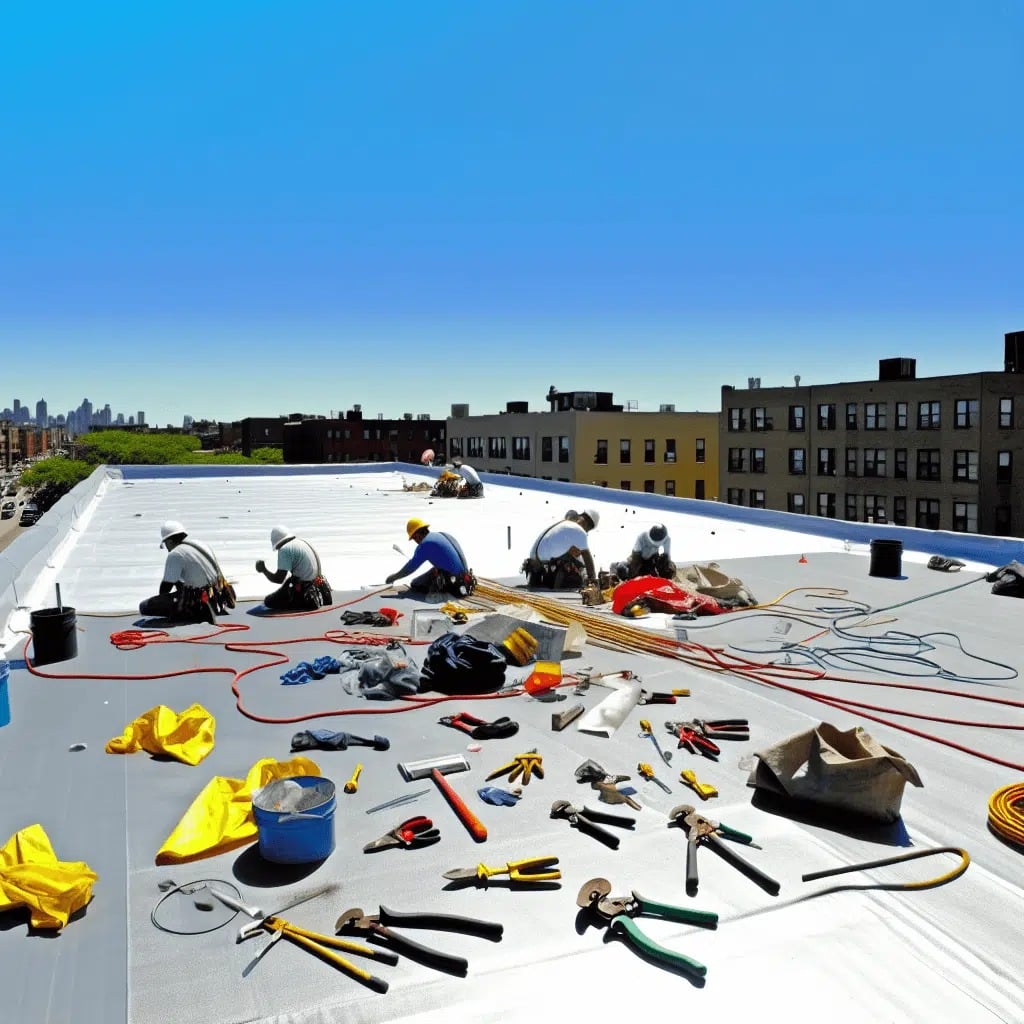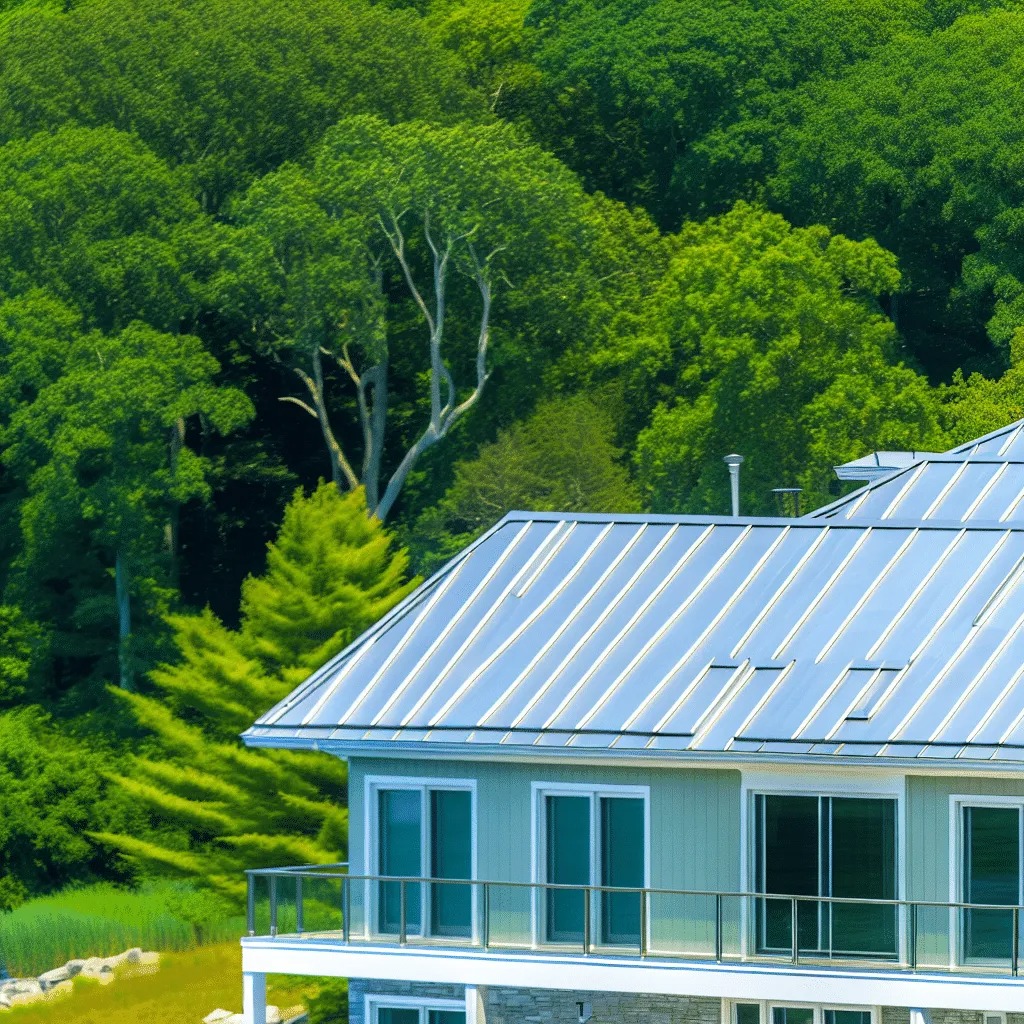The Vital Role of Non-Conductive Roofing in Kingston
The importance of selecting the right materials for your roof cannot be overstated, especially when the stakes involve the safety and efficiency of your home or business. In Kingston, where the elements can be as unpredictable as they are harsh, a roofing material’s ability to withstand electrical hazards is not just a feature—it’s a necessity. **Non-conductive roofing materials** offer a reliable solution, serving as a barrier against the dangers of electrical conductivity. For those living in areas with a high prevalence of lightning storms or heavy industrial activity, these materials are even more critical. It’s about making a choice that safeguards your property without compromising on performance.
Understanding Kingston’s Unique Weather Challenges
Kingston’s climate presents a mix of challenges to homeowners, with its range from crisp, cold winters to summers that can turn surprisingly warm. These fluctuations demand roofing materials that adapt to temperature changes while maintaining their protective qualities. Non-conductive materials rise to the occasion, providing insulation against electrical currents and the literal ups and downs of the thermometer. Thinking ahead to the type of roofing material that will serve your home well through every season is more than smart planning—it is a strategic move for longevity and peace of mind. This proactive approach is crucial in preventing weather-related damages and ensuring a lasting, resilient roofing investment.
Making an Informed Decision on Non-Conductive Materials
The long-term impact of your roofing material choice is significant, affecting not just immediate safety but also future energy costs and maintenance needs. By considering non-conductive options, you are investing in a solution that stands the test of time against potential electrical hazards. The key is to identify materials proven effective in preventing the transfer of electricity, offering you a layer of security that standard roofing cannot match. With the right information and guidance, you can select a roofing solution that embodies both safety and efficiency. Securing a non-conductive roof means prioritizing the protection of everything, and everyone, beneath it.
Delving Deeper: Non-Conductive Roofing Explained
Non-conductive roofing materials are not just another item on your building supply checklist; they represent a significant leap in protecting buildings from electrical threats. Materials commonly used for their non-conductive properties include rubber, PVC, and TPO—each with their unique advantages for safety and durability. These materials have been tested and refined to offer substantial resistance to electrical transmission, a property that could be life-saving during unexpected electrical surges. Installing a non-conductive roof is not merely a precautionary measure; it’s a decision to invest in a system specifically engineered to safeguard against the most severe weather Kingston might present. Aside from their primary benefit of electrical insulation, these materials also contribute to a building’s overall thermal efficiency.
Customized Solutions for Kingston’s Residents
The roofing needs of Kingston residents vary greatly, from residential homes requiring warmth and comfort to commercial buildings needing robust protection from the elements. No matter the requirement, non-conductive materials are adaptable, proving efficient across diverse architectural needs. They thrive in Kingston’s fluctuating temperatures, maintaining their structural integrity and insulation capacities throughout the year. It’s crucial to consider how each material performs under the specific conditions your property faces, taking into account local climate patterns. For personalized advice on the best non-conductive solutions for your premises, consider reaching out to professionals who can provide **tailored recommendations**.
Enhancing Roofing Efficiency in Kingston
In the quest for an electrically safe and efficient roofing solution, residents of Kingston can find a variety of options that blend safety features with energy savings. The right non-conductive roofing material can contribute significantly to reducing your home’s heating and cooling costs. Especially in areas where energy efficiency is a growing concern, these materials can provide an eco-friendly approach to roofing without compromising on quality. Advanced materials not only possess non-conductive properties but also boast high durability, minimizing the need for frequent maintenance. For insights into how to optimize roofing for electrical safety and energy efficiency, check out Rinaldi Roofing’s green roof systems that embody innovation and sustainability.
Final Considerations: Securing Your Investment
When it comes to roofing, the right decision can mean the difference between a secure investment and a potential future liability. The selection of non-conductive materials for your Kingston property is more than a practical consideration; it’s a strategic decision for long-term building safety and cost savings. These materials, when correctly chosen and installed, provide a reliable bulwark against electrical risk, affording peace of mind to residents and business owners alike. The process of installing a non-conductive roof should be handled by experienced professionals who understand the unique demands of the Kingston climate. Quality, when it comes to roofing, is an investment—one that protects both the structural integrity of your property and the safety of those within.
Building Lasting Relationships with Roofing Experts
Collaborating with a trusted roofing contractor ensures that the expertise behind your non-conductive roofing solution matches the material’s quality. Local professionals understand the specific challenges and opportunities that come with the Kingston area, offering invaluable insights that transcend what typical generic guidance can provide. Establishing a strong partnership with your roofing contractor means that you have not only immediate support but also long-term maintenance and advice. These relationships are instrumental in keeping your roof in optimal condition, maximizing the investment you’ve made in non-conductive materials. To find a dedicated team that puts your safety and satisfaction first, turn to local Kingston experts at Rinaldi Roofing with their residential roofing services.
Empowering Kingston Homeowners with Knowledge
Awareness and education are key components in making an informed choice about your roofing materials. Homeowners in Kingston who understand the benefits of non-conductive roofing are better equipped to make decisions that will positively impact their homes and families. It’s important to keep abreast of the latest material innovations, sustainability factors, and safety certifications. Armed with this knowledge, you’ll be in a strong position to make choices that reflect not just current trends but also future possibilities. Non-conductive roofing isn’t just a smart choice for today—it’s a forward-looking decision that ensures your Kingston home remains safe, efficient, and modern for years to come.
Roofer’s Insights: Non-Conductive Know-How
Tip 1:
When selecting non-conductive roofing materials, prioritize products with proven performance in resisting electrical conductivity. A roof’s material can be a critical line of defense against electrical hazards, especially in areas prone to storms or power line issues.
Tip 2:
Always consider the thermal properties of non-conductive materials. In Kingston’s variable climate, your roof should not only be electrically safe but also efficient in maintaining indoor temperatures throughout the seasons.
Tip 3:
Consult with a local Kingston roofing specialist who has experience installing non-conductive materials. Their expertise will ensure that your roof complies with regional building codes and withstands local weather patterns.
Tip 4:
Inquire about the lifespan and warranty of non-conductive roofing materials. Understanding how long these materials are expected to last and what kind of maintenance they require can provide a long-term view of your investment.
Tip 5:
Consider the eco-friendliness of your non-conductive roofing materials. Many modern options are not only safe and effective but also sustainable, which can positively impact your property’s environmental footprint.
Expert Answers to Your Roofing Questions
What Are Non-Conductive Roofing Materials and Why Are They Important?
Non-conductive roofing materials are designed to resist the flow of electrical current, enhancing the safety of your building by reducing the risk of electrical shocks or fires, especially in areas prone to lightning.
How Do Non-Conductive Roofing Materials Aid Safety in Varied Weather Conditions?
These materials provide an extra layer of protection against electrical hazards in adverse weather, and their insulating properties help maintain structural integrity through Kingston’s range of temperatures.
Which Non-Conductive Roofing Materials Are Most Effective for Kingston’s Climate?
Rubber, PVC, and TPO are among the most effective non-conductive materials for Kingston’s climate, offering durability and efficiency in both cold winters and warm summers.
Can Non-Conductive Roofing Materials Lower Energy Costs?
Yes, due to their insulating properties, non-conductive materials can help keep buildings warmer in winter and cooler in summer, potentially lowering energy costs over time.
Is the Installation of Non-Conductive Roofing Materials Different?
Installation may require specialized skills to ensure safety and efficacy, so it’s important to work with professionals experienced in non-conductive roofing systems.




